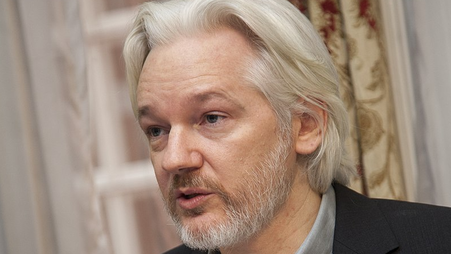Justice Dept. and Julian Assange reach plea deal in case that threatens press freedom


AP Photo/Cliff Owen
The Espionage Act is an unconstitutional law used to prosecute whistleblowers and news publishers.
The Espionage Act is a broad secrecy law that outlaws the sharing of defense information with anyone, for any reason.
In recent years, the law has been wielded to stifle dissent and journalism. Whistleblowers have been imprisoned under the law. It’s also been used against journalists and news outlets that publish government secrets.
We must reform the Espionage Act to distinguish between spying and the exposing of wrongdoing.

A brave whistleblower served as a source to stories that shaped the public understanding of the otherwise secret U.S. drone program. He's serving a prison sentence as lawmakers reckon with the very information he revealed.

As major news organizations meet with the Department of Justice today to discuss the recent journalist surveillance scandals, it’s vitally important that they press the Attorney General to drop the prosecution of WikiLeaks founder Julian Assange. If the case continues, it would render the new press freedom progress worthless.

A coalition of two dozen press freedom, civil liberties, and human rights groups call for an immediate end to the prosecution of Julian Assange by Biden's Department of Justice.

Freedom of the Press Foundation's statement on the the rejection of the US's extradition request of WikiLeaks founder Julian Assange

Could this presidential administration bring charges against the New York Times for publishing information about Donald Trump's tax returns? Could its Department of Justice claim health privacy laws are being violated when news outlets report on the massive cluster of coronavirus infections currently spreading in the White House?

The extradition hearing in the trial of Wikileaks editor Julian Assange is now halfway complete, and the court has heard from two Freedom of the Press Foundation co-founders—executive director Trevor Timm and board member Daniel Ellsberg—as expert witnesses for the defense.

The extradition process for Julian Assange has officially gotten underway. When the charges were originally revealed last year, Freedom of the Press Foundation led the charge in denouncing them, and we were joined by the unanimous voices of the civil liberties and press freedom community.

Recent raids on journalists and newsrooms in Australia are the latest in a string of instances — in no way limited to Australia — of government targeting of journalists for their reporting.

Here’s what numerous civil liberties and digital rights groups had to say about the implications of the new unprecedented charges against Julian Assange under the Espionage Act.

The Trump administration’s new charges against WikiLeaks and Julian Assange are the most fundamental threat to press freedom in the 21st century